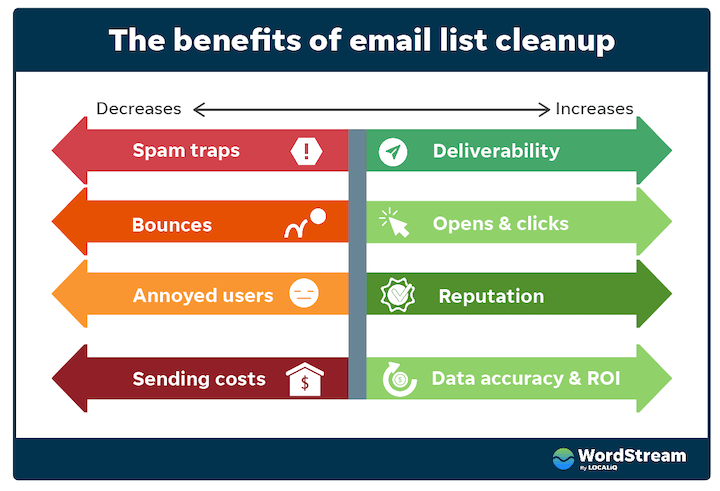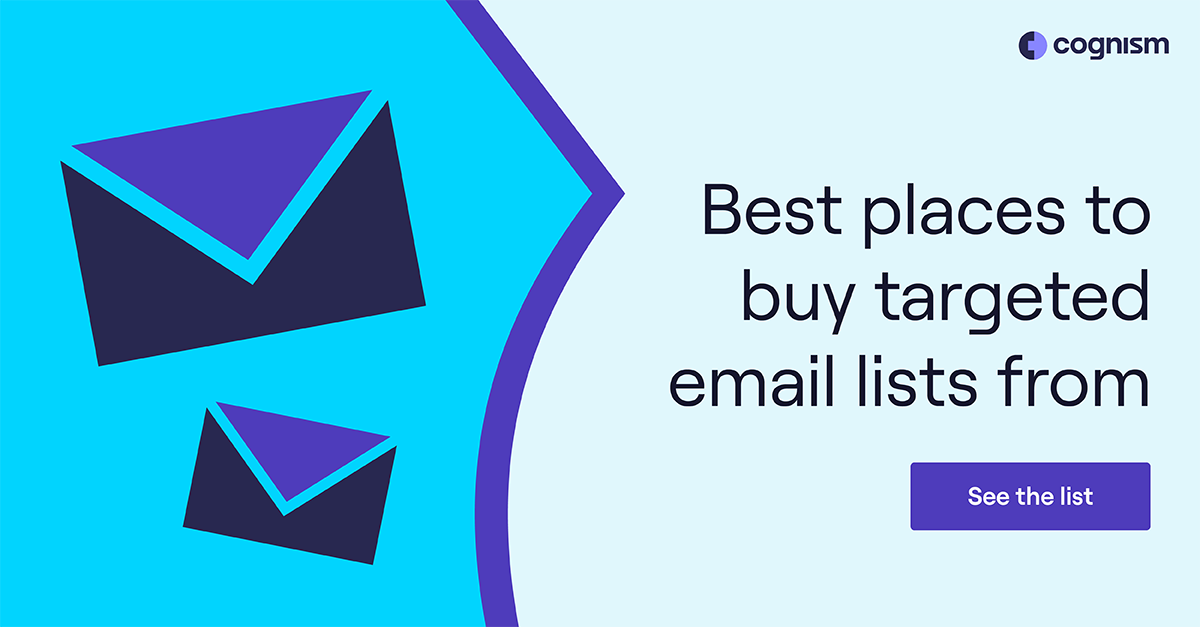20 Good Suggestions For Deciding On Email List Sellers
Wiki Article
What Do I Need To Think About When Purchasing A Hematologist Email List?
In order to get the most efficient results, it is important to take into consideration several factors. This includes whether or the information is correct, legal and relevant to you marketing goals. These are the most crucial considerations to consider. Quality of data and accuracy
Source of data: Verify the provider's use of trustworthy sources such as professional directories, databases or opt-ins from hematologists. How accurately the contacts are collected will determine the quality and accuracy of the email list.
Updates and verification: Learn how the provider validates data. Verify email addresses to get rid of invalid or invalid addresses. Updates are necessary to keep the list up to date when healthcare professionals switch their jobs or work at different institutions.
Segmentation by Specialization: The list must be specific to hematologists. If you can, divide the list further, such as by subspecialty, location and years of practice or an affiliation with hospitals. Well-segmented list helps you to focus your outreach more effectively.
2. Conformity to Legal Regulations
Data Privacy Laws â Ensure the list conforms to relevant laws and regulations, such as California Consumer Privacy Acts within the U.S.A. or General Data Protection Regulations in Europe. It means that the emails should be gathered only with consent.
CANSPAM Act: If are located in the U.S.A. Make sure that the list complies to the CANSPAM Act which governs all commercial emails. Non-compliance with the CAN-SPAM Act can lead to penalties. Furthermore, your email could get considered spam.
Opt-in Consent: The consent list should be comprised of those hematologists who have agreed to receiving emails from third party. Sending unwelcome emails to those who haven't signed up could lead to poor engagement or legal issues.
3. Provider Reputation
Examine the reputation of the company. To determine if the business is reliable, look for reviews, testimonials as well as case studies. A company with a solid track record is likely to offer data of high quality and conformity.
Transparency - Choose a data provider that is transparent regards to where the data originated from and how it was collected. The providers who are ambiguous and unclear about the method they collect data ought to be avoided.
Customer Service: It is important to select a provider who has a good level of customer support. Support is vital if encounter issues with your setup or technical configuration, need to customize your list or have compliance questions.
4. Cost as well as Return on Investment (ROI)
Pricing Model: Pay close attention to the pricing structure. Do you want a fixed cost or a pay per -contact? Ensure that the price is in line with the expected ROI, and balances list quality and quantity with your marketing budget.
Refund or Replacement Policy: A trusted service will provide a refund or replacement policy for invalid or outdated email addresses that are not valid or outdated. Be sure to read the entire conditions and terms of the policy before making any purchases.
Value for Money Comparing list features like segmentation options and data accuracy guarantees together with the price. The list with the lowest cost might not always be the most valuable if its data quality falls short.
5. Ownership of data and use
The difference between a single use and a list of email lists with multiple uses. Understanding the rules of use is crucial. Certain email providers will only let you use their list for a single campaign. Other providers may grant you full ownership and unlimited use rights.
Exclusive vs. Shared lists: Determine whether the list belongs to your business or distributed to other buyers. Exclusive lists are more likely to generate more engagement since the contacts have less exposure to emails from marketing.
6. Data Integration and Format
Compatibility with CRM and Email Tools: Make sure that your email list can easily be integrated into CRM or email tools. The list should be accessible in common formats like CSV or Excel to allow seamless integration.
User-Friendliness: Consider the ease with which it is for you to manage and filter your list. Lists with a lot of data that is difficult to use or segment could reduce the effectiveness and effectiveness of your campaign.
7. Ethical Concerns
Relevance of Email Outreach to Hematologists. Be sure that your outreach emails are relevant to Hematologists. Not sending them content that does not correspond to their expertise could result in poor engagement, and could negatively affect your image.
Avoid spam practices: Don't bombard recipients with a lot of emails. The sending of spam complaints could harm your reputation if you send out too many emails.
The final sentence of the article is:
It's crucial to think through the pros and cons of purchasing the list of hematologists. You should focus on the accuracy of data, compliance with privacy regulations and the credibility of the provider to get an accurate and useful list. The importance of segmentation, as well as the legal requirements and ethical advertising will help you maximize ROI and ensure your brand's image. Read the top hematologists email list for blog recommendations.

What Factors Should I Think About When Purchasing An Urgent Care Email List?
It's crucial to think about a number of factors when purchasing an email list for urgent treatment. This will help ensure that the list you buy is correct, compliant with law, and pertinent to your marketing goals. Be aware of these crucial aspects: Data Accuracy and Quality
Data source: Ensure that the service provider has sourced their data from reliable sources, such as medical associations or databases for healthcare. Avoid lists generated by scraping data or other unreliable methods that could include outdated and inaccurate information.
Verification Procedure: Confirm that the email list has been regularly checked and updated. A reliable provider follows a rigorous verification procedure to eliminate invalid, old, and duplicate email addresses. This guarantees high delivery and decreases bounce rate.
Segmentation and Targeting The segmentation should contain details such as the area of the facility (e.g. city or state, or even a region) and its size and any specialties (e.g. diagnostics and pediatrics, etc.)) and roles of key decision-makers (e.g. doctors and practice owners). Lists with a specific focus can increase the reach of your outreach and boost engagement.
2. Legal Regulations
Data Privacy Laws - Ensure the list conforms to applicable data privacy laws including the General Data Protection Regulation in Europe and the California Consumer Privacy Act in the U.S.A. Email addresses must be collected with consent and handled in accordance with lawful processes.
CAN-SPAM Act Compliance: in the U.S., your email marketing campaigns must comply with the CAN-SPAM Act. This means you have to include an opt-out option avoid using misleading subject line as well as include the physical address of your customer when you send emails. Infractions could lead to penalties or a damaged brand image.
Opt-In Consent: Check to see if the email addresses that are listed have been acquired with an explicit opt-in consent in which the recipient has agreed to receive third-party marketing communications. This will reduce the chance of receiving spam complaints or legal issues.
3. Provider Reputation
Established Providers: Choose one with an established track record of providing compliant and high-quality lists. Look through testimonials, reviews or case studies from past customers to assess the company's reliability and customer satisfaction.
Transparency: The service provider must be able to explain how the data was obtained and how often it's changed. If the provider cannot be able to provide clear explanations of the methods used to collect data this could indicate low-quality data.
Support for customers: It's essential to have a solid customer service team if you are looking for assistance with technical issues or list customization. A company that is responsive can to assist you in getting the best value from your list.
4. Cost and return on investment (ROI).
Pricing models: Email list providers offer different pricing models like flat fee or pay-per contact. It is recommended to evaluate the pricing structure in relation to your marketing budget and the expected return. Take into consideration the cost and the quality of your list.
Refund or Replacement Policy: Reputable service providers usually offer a refund or replacement policy in the event that a substantial part of the email addresses are invalid or undeliverable. Make sure you understand the conditions and terms of the policy prior to you purchase.
Value for money: Instead of selecting the cheapest list, select lists that have accurate data and detailed segmentation. A database that is of high quality will increase engagement and return on investment.
5. Ownership and Use of Data
Lists which can be used multiple times, or for only single campaigns: Be clear about whether the list will be used only once or a number of times. Lists that permit multiple uses are more valuable. This is especially the case if you are planning to conduct ongoing campaigns.
Shared with other buyers. Exclusive lists: Determine whether the list is exclusive to your company or shared with other buyers. Shared lists: Decide whether the list belongs solely to your company or shared with other buyers. The shared list can cause fatigue in recipients, who could receive messages from multiple organizations.
6. Data Integration and Format
CRM Compatibility. Make sure your email lists are delivered in formats that are compatible with the platform you use for email marketing or relationship management, for example CSV or Excel. This will ensure a seamless integration, and allows you to start your campaigns quickly.
Ease of use Email lists must be easy to manage and segment based on specific criteria. A well-organized list will make targeting and personalization more effective.
7. Ethical Questions
Relevance of content: Urgent-care professionals are often busy, so it is important that you give them relevant and relevant information. Customize your messages to meet their particular needs for example, the medical equipment, supplies or medical technology they require. Unrelated content can damage your brand's image and decrease engagement.
Reduce the frequency of your email. Sending excessive amounts of emails or spam messages can lead to complaints about spam and harm your reputation.
Conclusion
If you are purchasing an urgent email list, pay attention to the accuracy of the information, the legal compliance, and the credibility of the vendor. Make sure the list is frequently updated, and in compliance with privacy regulations for data. By sending targeted content and investing in a well-designed and high-quality mailing list you will increase the number of people who respond and earn a decent ROI for your investment. Have a look at the top rated urgent care email list for website info.
